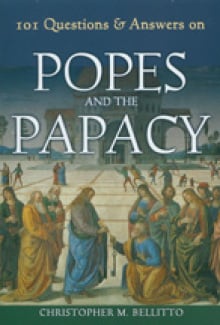Q: Did a pope really condemn Galileo for saying the Earth revolves around the Sun?
Read more from the papal answer man, Chris Bellitto and his new book, 101 Questions on Popes and the Papacy.
A: The answer is yes—kind of.
 The thing to remember is that the issue was less about astronomy and science than authority. The pope in question was a complex man, Urban VIII (1623-1644): a very well-educated aristocrat, humanist, diplomat, patron of artists and architects (including Gianlorenzo Bernini, 1598-1680), and generous supporter of missions and evangelization, but also a pope guilty of nepotism, greed, absolutist tendencies, and poor political decisions. Some scholars think of him as the last Renaissance pope in the best and worst senses. Like some of his predecessors, Urban VIII was fascinated by astronomy and supported scientists in their work, including his friend Galileo (1564-1642), whom he had praised in print and defended from condemnation while still a cardinal.
The thing to remember is that the issue was less about astronomy and science than authority. The pope in question was a complex man, Urban VIII (1623-1644): a very well-educated aristocrat, humanist, diplomat, patron of artists and architects (including Gianlorenzo Bernini, 1598-1680), and generous supporter of missions and evangelization, but also a pope guilty of nepotism, greed, absolutist tendencies, and poor political decisions. Some scholars think of him as the last Renaissance pope in the best and worst senses. Like some of his predecessors, Urban VIII was fascinated by astronomy and supported scientists in their work, including his friend Galileo (1564-1642), whom he had praised in print and defended from condemnation while still a cardinal.
As long as Galileo asserted that the idea of the Earth revolving around the Sun was an experiment or hypothesis, he was left alone. He had been warned to do so by none other than the papal defender, the Jesuit Robert Bellarmine (1542-1621). With the election of his friend as Pope Urban VIII, Galileo felt comfortable in going further to state as scientific fact the Copernican or heliocentric model of the sun as the center of the solar system. When Galileo did so, he ran into trouble since it conflicted with the church notion of the Earth as the center of the universe.
We must remember that the ultimate interpreter of the Bible was the pope and he would not give up this authority, especially only a century after the Protestants had said everyone could read and interpret the Bible for themselves. Galileo must have been surprised (if not shocked and even betrayed) to find that his former defender, now Urban VIII, had moved the conversation from astronomy, mathematics, and science to theology, authority, and obedience. In 1633, Galileo was faced with condemnation and chose to take back his scientific statements; he spent the rest of his life under house arrest and was unable to teach or write publicly.
To jump a few centuries ahead: the rehabilitation of Galileo was one of the earliest tasks John Paul II explored, starting just a year after his election. The pontifical commission he ordered to reopen the case concluded in 1992 that Galileo’s critics had misunderstood scripture and had mistakenly taken it as not only fact, but religious doctrine, that the Earth must be the center of the universe. As a result, John Paul II declared the church had made a mistake in condemning Galileo.
